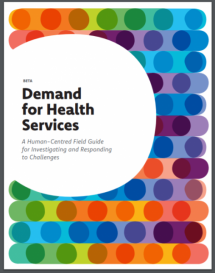Demand for Health Services: A Human-Centred Field Guide for Investigating and Responding to Challenges
This field guide introduces human-centered design as an approach to addressing challenges related to community demand for basic health services like immunization.
Human-centered design is a problem-solving process that begins with understanding the “human factors” and context surrounding a challenge and works directly with users—the intended clients or consumers of services—to develop solutions that are viable and appropriate in a given context.
The methodologies in this toolkit focus on collaboration and designing with—not for—the people we seek to serve. Human-centred design works to uncover latent needs that service providers and program recipients may not even know they have before the process begins. The approach is “bottom up” in the sense that both problems and solutions are defined and developed locally, not imposed from elsewhere. While this guide primarily focuses on issues and examples related to immunization, the process and tools are relevant to a broad range of health programs that depend on generating community demand for services.
Last modified: November 10, 2021
Language: English

